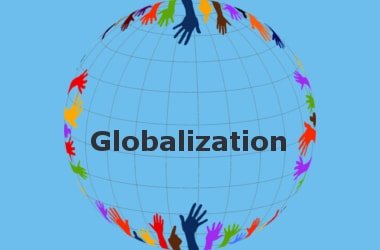What is globalization
Introduction to globalization
After completing this lesson, you should be able to:
- Explain what is meant by the term "globalization".
- Explain what is meant by local and global culture
- Differentiate between acculturation and globalization
Before completing the module below, please read the section of the textbook called Globalization and identity. When reading this section, please make note of the following important concepts:
- Delocalization
- Global vs local culture
- Globalization
- Bicultural identity
- Identity confusion
Task I. Mastering concepts
Read through the following presentation - and then answer the questions below.
Checking for understanding
1. Give an example of globalization in your own local culture.
Examples of this include "foreign" foods that have become part of your local diet, music or film that is now part of local entertainment, even though it did not originate in your country, or shops that are not originally from your country.
2. Why is "global" culture often referred to as "Westernization?"
The values of the global culture are those that most commonly associated with Western cultures - e.g. individualism, democracy, freedom of expression. In addition, the language of the Internet is for the most part English. Although more and more of the WWW is in Chinese, for example, the English language sites are the ones that currently have the greatest cross-cultural influence.
3. How do people "access" the global culture?
The most common way is through the Internet. However, it can also be through travel, film and television, or working for an international company.
4. What are the characteristics of someone who is bicultural?
People who are bicultural are usually raised in one culture at home and then live in another culture when not at home. They are often bilingual, but most importantly, they are comfortable in both cultures. So, in the case of globalization, they are happy being a "globalized citizen" and working in an international workplace - but they are also comfortable in their local culture.
5. What does it mean to be marginalized from the global culture?
This means that an individual is not accepted or satisfied with their local culture, but does not have access to the global culture. They may feel rejected by the global culture because of socioeconomic factors or a sense of discrimination based on race or religion.
Write an introductory paragraph for the essay: Discuss the effect of globalization on behaviour. In the paragraph, you should define globalization and explain Berry's model of acculturation with regard to globalization. No research should be included.
Exam tip
Although Berry's model can explain how we adapt to or reject globalization, it is important to remember that globalization is not the same as acculturation.
I have lived in the Czech Republic since 1987. When I moved here, it was communist Czechoslovakia. It was culturally isolated and rejected all forms of westernization. You could say that the Czechoslovaks were separated from the global culture. You could also argue that since many of them rejected the local culture - which was controlled by the communist system - and yet had no access to the globalized culture, many Czechoslovaks were marginalized.
After the fall of communism, there was an incredible surge of exposure to the global culture. This started with large numbers of tourists and the introduction of western businesses (Marks and Spencers, McDonald's, Starbucks, Foot Locker) which quickly started to have an effect on the local people. Czechs and Slovaks also began to travel and watch foreign films. English was now taught in schools. The local culture evolved by being exposed to these global influences. Some started to resent the traditional Czech culture and wanted to be Western. They often became assimilated in the global culture - and many ended up leaving the country. Others have found that they thrive in the global workplace, but also treasure the Czech language and culture, spending weekends hunting for mushrooms in the forests near their grandmother's country house. These Czechs were integrated.
It is important to use this framework for understanding globalization. If a person immigrates to another country, you can definitely discuss the process of acculturation - but this is not globalization. Using acculturation research that is not directly linked to globalization does not earn marks on the exam.
Continue to Globalization and behaviour

 IB Docs (2) Team
IB Docs (2) Team

